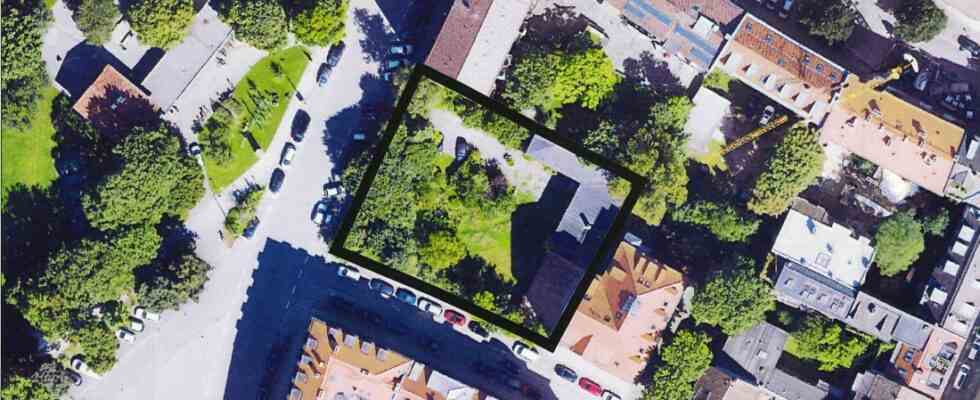It is a piece of land that has long made one wonder why there are no flats on it: beautiful Untergiesing, very close to the Isar, opposite the Schyrenbad. But now it looks as if something is going on at the corner of Claude-Lorrain-/Untere Weidenstraße – and as if affordable living space will also be created there thanks to a new legal regulation.
At its most recent meeting, the city council’s planning committee decided to use the instrument of the “sectoral development plan” and thus stipulate that 40 percent of the apartments must be subsidized. How much building rights exist on the property has not yet been clarified. But the planning department assumes in a “rough estimate” that a six-story building with 4,700 square meters of floor space could be possible. That corresponds to about 50 apartments.
Entries in the land register show that the property had been owned by a family since 1990 and was inherited twice. In the middle of this year, the heirs cashed in and sold the area to CLS 19 Grundstcks GmbH, which was backed by an investor from Bremen. But he passed it on directly to the building Munich 1a GmbH & Co. KG from Graefelfing, which has been the owner since November 3rd. Behind it is the real estate company Bauwerk, which is known for high to highest priced residential construction in Munich. Current projects are the envelope factory in Pasing and two plants on Gabrielenstrasse (Neuhausen) and on Infanteriestrasse (Schwabing).
A city councilwoman calls the sectoral development plans “our hope”
The city council decision goes back to an application that the green-red city hall coalition had made in the summer with the opposition faction of Die Linke/Die Party. Accordingly, the administration should examine whether a sectoral development plan for the property in Untergiesing is an option. The instrument has been available to municipalities since an amendment to the building code, the “Building Land Mobilization Act”. They can use it to make specifications for social housing in areas – especially inner-city areas – for which no development plan exists. Previously, the city had no control over the type of housing that would be built on such sites – which allowed the “luxury residential complex” business model that Bauwerk and many other companies operate to flourish.
Green City Councilor Anna Hanusch describes sectoral development plans as “our hope” for areas “in which we otherwise have no control”. The instrument can be “used with little effort”. Brigitte Wolf (left) was also pleased, but requested that the city set a 60 percent share of subsidized apartments.
A wish for which Simone Burger (SPD) expressed understanding. “We also spoke in the parliamentary group about 50 or 55 percent.” But she pointed to the risk that courts could declare such values inadmissible. “We find 40 percent appropriate when weighing up legal certainty and what we want to get out of it as much as possible.”
Heike Kainz (CSU) explained that her parliamentary group considers the sectoral development plan to be “anything but a great solution concept” and that the additional administrative effort for 50 apartments is “considerable”. Nevertheless, the matter is supported “in this individual case”. Only Jörg Hoffmann (FDP) spoke out against the decision: “Where are we going if we look at every piece of land that could reasonably meet the conditions for a sectoral development plan?” He was the only dissenter to the resolution.
Unresolved is the question of whether and to what extent owners must be compensated if their property loses value due to the partial social commitment. In Munich, millions of euros are immediately at stake. So far, the city has drawn up two sectoral development plans, for the Hohenzollernkarree in Schwabing and a property on Tegernseer Landstraße in Obergiesing. The city had previously issued notices of possible developments there. This could result in claims for compensation that would have to be clarified in court. But that is not the case on Claude-Lorrain-Strasse, where there have not yet been any preliminary building inquiries or building applications. “Therefore,” said Jacqueline Charlier, deputy head of the planning unit, “we would have to do without compensation.”
Apparently no resistance is to be expected from the owner in this case. When asked about possible lawsuits and claims for compensation, Bauwerk is jovial. One is “well prepared” for the sectoral development plan. We look forward to the dialogue with the city of Munich,” explains a spokeswoman. Since we have worked well together in recent years, “we assume that together we will be able to quickly and effectively create the living space that is so urgently needed”.

